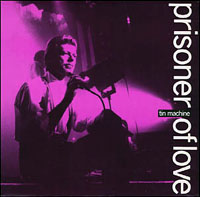| "Prisoner of Love" | ||||
|---|---|---|---|---|
 | ||||
| Single by Tin Machine | ||||
| from the album Tin Machine | ||||
| B-side | "Baby Can Dance" (Live) / "Crack City" (Live) | |||
| Released | 30 October 1989 | |||
| Recorded | August 1988 – early 1989; studio material recorded at Mountain Studios, Montreux Switzerland, and Compass Point Studios, Nassau live recording 25th of June 1989; at La Cigale, Paris | |||
| Genre | Rock | |||
| Length | 4:09 | |||
| Label | EMI MT 76 | |||
| Songwriters | ||||
| Producers | ||||
| Tin Machine singles chronology | ||||
| ||||
"Prisoner of Love" is a song by Tin Machine taken from their eponymous debut album, issued as their third single in October 1989.